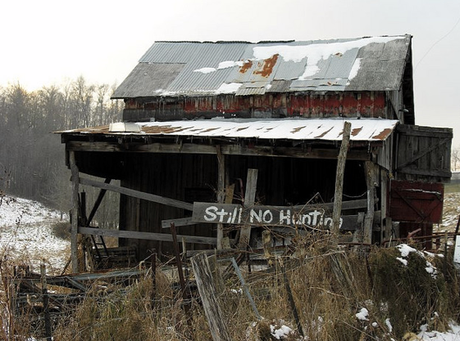A few weeks ago, I asked folks on Twitter–and specifically, my colleague Amy Simpson, who has recently published a book on mental illness and the mission of the church:
What do you think about the way people use words like “bipolar,” “crazy,” and “manic” when they really mean “moody,” “energetic,” “quirky” and even “fun”?
It’s part of a pattern I’ve noticed lately–and maybe you’ve noticed it too.
People with beautiful headshots, flawlessly designed websites, and enviable accomplishments insist that they are really just a ‘mess.’ Or that their families are ‘crazy.’ Or that their homes and lives are every bit as complicated and frustrating as everyone else’s…meanwhile, their Instagram feeds show nothing but beauty; if ‘chaos’ is there, it’s only ever of the picturesque kind.

There’s nothing picturesque about true squalor of the sort that Jeannette Walls endured. From Flickr User Tanja. CC license.
There are no birdcages sprouting stalagmites and stalactites of bird droppings. There are no snotty-nosed, unwashed, half-dressed, hungry children who’ve never visited a dentist in their lives. There is food in the fridge and on the table, and it isn’t even growing mold or crawling with roaches or undulating with maggots. In fact, it’s from Trader Joe’s and may even be organic! There is no broken glass or police officers showing up because the neighbors heard screaming. There is electricity and running water and indoor toilets.
Yeah, there’s raised voices and tempers and conflicts. But that makes you human. Not crazy. Not dysfunctional. Not “a mess.”

This weekend, I read and then immediately re-read Jeannette Walls’ instant classic of a memoir, The Glass Castle. It disturbed me deeply, but reminded me very much of one of my favorite books, A Tree Grows in Brooklyn. It is hard to resist a story of a girl triumphing over seemingly insurmountable adversities.
One of the things that I appreciated deeply about the book is that while it ends, ultimately, on a note of grace, and while there are glimpses of light even in the most dismal of episodes as her truly dysfunctional parents (both probably bipolar, and one a severe alcoholic), Walls never glamorizes the poverty that they endured. She does not romanticize any of it. She makes no attempt to paint her childhood as in any way quirky, cute, or picturesque.
Without lapsing into melodrama, she portrays it as the nearly unmitigated horror that it was.
And while she and two of her siblings managed to endure and make something of their lives, she makes no attempt to hide the fact that one of them–her younger sister, Maureen–didn’t seem to. Nor does she disguise the scars–some of them literal–that they bear because of their parents’ recklessness and refusal–or inability–to care for them properly.
There are two things that I keep thinking of as I reflect on this book.
The first is that while it is easy to celebrate the hard work and grit and good luck that allowed someone like Jeannette Walls to triumph and to tell her story with such grace and elegance, there are millions of children in the US who endure terrible suffering and do not emerge victorious but instead become the victims of their parents’–and society’s–failure to help them while help is still possible.
As I think each time I reflect on Anne Frank, how many stories like hers never got to be told? How many stories of triumph over poverty, ignorance, and mental illness could be told in this land of plenty and opportunity, if resources were directed away from war and toward the kinds of programs that make it possible for all children to succeed?
The second is that I’m really tired of seeing words like “bipolar,” “crazy,” and “messy” thrown around by middle and upper-middle class folks who have beautiful headshots and gorgeous websites and lovely homes and the time and resources to document their “messiness” and “craziness” on Instagram. Not wanting to make your kid a costume for a school play or serving a frozen Trader Joe’s meal for dinner is not a “mom fail.”
Losing your temper with the kids moments after you were laughing uproariously with your girlfriends does not make you “bipolar.” Running from school to music lessons to sports practice to a church event might mean you’re overscheduled–but not that you’re “manic.”
These words describe serious and scary symptoms of serious disease. Millions of children–in the US–would count it a huge step up to be eating Annie’s Organics mac & cheese made from a box or making do with a less-than-Pinterest-ready birthday party.
In her memoir A Good and Perfect Gift, my friend Amy Julia Becker noted the pain she felt when a friend described her Ivy League-educated husband as “retarded” because he couldn’t remember to take out the recycling. The words were like a slap: no, he clearly did not have an intellectual disability. But Amy Julia’s own beloved daughter, born with Down syndrome, did.
Using words in that thoughtless and inaccurate way may seem harmless, but it trivializes the real struggles of real people.
So let’s not make light of real suffering by calling our generally okay, pretty much functional, and actually pretty privileged lives “messy,” “dysfunctional,” and “crazy.”
And as we celebrate people like Jeannette Walls (whose book spent almost 2 years on the New York Times’ bestseller list) let’s remember the people who never lived, much less wrote, stories of triumph.
